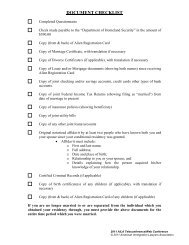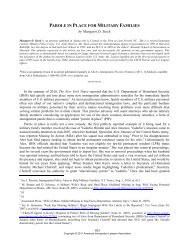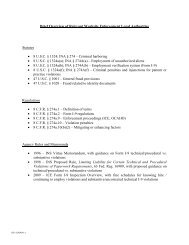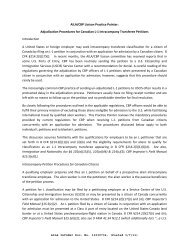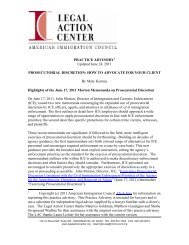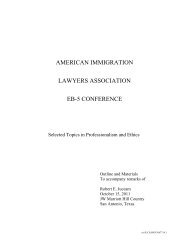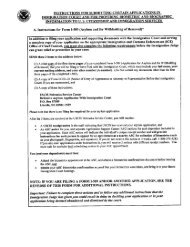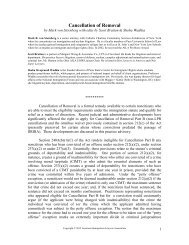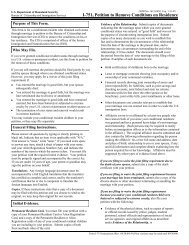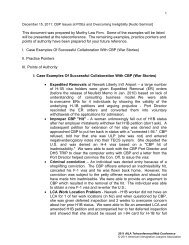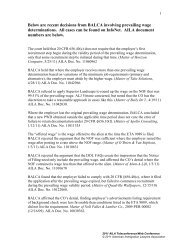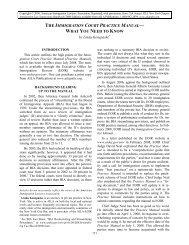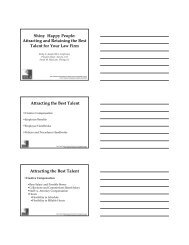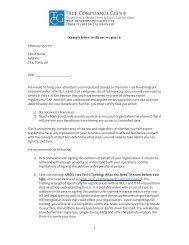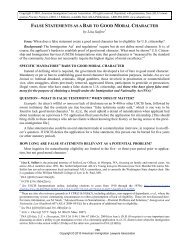Resources for 9-13-11 Seminar - AILA webCLE
Resources for 9-13-11 Seminar - AILA webCLE
Resources for 9-13-11 Seminar - AILA webCLE
Create successful ePaper yourself
Turn your PDF publications into a flip-book with our unique Google optimized e-Paper software.
Copyright © 2010, American Immigration Lawyers Association. All rights reserved. Reprinted, with permission, from <strong>AILA</strong>’s Immigration<br />
Practice Pointers, (2010–<strong>11</strong> Edition), available from <strong>AILA</strong> Publications, 1-800-982-2839, www.ailapubs.org.<br />
“DOS” AND “DON’TS” FOR ATTORNEYS REPRESENTING VISA<br />
APPLICANTS (AND FOR CONSULAR OFFICERS, TOO!)<br />
by Liam Schwartz, Avi Friedman, and Anastasia Tonello *<br />
The relationship between U.S. consular officers and attorneys is a delicate one. The parties are constantly<br />
trying to maintain a balance that respects both parties’ rights and obligations. Consular officers would benefit<br />
from permitting the attorney to facilitate their adjudications through proper case preparation and legal citations.<br />
Attorneys, in turn, would benefit from receiving background in<strong>for</strong>mation necessary to best serve the<br />
client/visa applicant from consular officers.<br />
Often, as attorneys, we are frustrated by an inability to gain real-time responses from consular posts to<br />
questions that are not addressed on consular websites or responses to case inquiries. Consular officers may<br />
decline to communicate with an attorney who is perceived as unprepared or an overzealous advocate.<br />
We believe that the ultimate success of this process lies with holding attorneys and consular officers accountable<br />
<strong>for</strong> maintaining a constructive working relationship. It is with this in mind that we offer the following<br />
list of “DOs” and “DON’Ts” <strong>for</strong> nonimmigrant (NIV) and immigrant visas (IV) cases. In addition to general<br />
suggestions <strong>for</strong> attorneys, the list relates to special processing issues: E visa applications in London,<br />
third-country national (TCN) visa processing in Canada and Mexico, and security advisory opinions (SAOs).<br />
The list ends with a number of proposed “DOs” and “DON’Ts” <strong>for</strong> consular officers involved in the visa<br />
application process. These proposals are offered with respect, and in recognition of the many pressures placed<br />
on visa officers in the course of their work. We hope these proposals will underline the belief expressed by<br />
William D. Morgan—who did more than anyone to promote the consular function within the Department of<br />
State (DOS)—that in reality, lawyers are “our friends and supporters.” 1<br />
ATTORNEY ACCOUNTABILITY<br />
General<br />
• To ensure that clients receive the most efficient service, the best place to start to learn about a consular<br />
post’s visa operations and any special application procedures, is the post’s website. In recent years, DOS<br />
has made significant progress in improving individual consular post websites to provide more uni<strong>for</strong>m and<br />
helpful in<strong>for</strong>mation to the public. Consular post websites may be accessed through the DOS’s own web-<br />
* Liam Schwartz is a principal in Liam Schwartz & Associates. Schwartz was recently named as one of the worlds’ top 10<br />
most highly regarded immigration lawyers by the International Who’s Who of Corporate Immigration Lawyers. He is on the<br />
executive committee of the <strong>AILA</strong> Rome District Chapter, is a past chair of <strong>AILA</strong>’s Department of State Liaison Committee,<br />
and chaired the 2009 <strong>AILA</strong> Rome District Chapter Spring Conference in Tel-Aviv. Schwartz authors the monthly “Consular<br />
Corner” column <strong>for</strong> ILW.COM and moderates the Consular Corner site on Facebook (www.facebook. com/ConsularCorner).<br />
Avi Friedman is a senior associate with Wolfsdorf Immigration Law Group. He is currently serving on the 2009–10<br />
<strong>AILA</strong>/DOS Liaison Committee, and is also serving his seventh term as the consular affairs liaison <strong>for</strong> <strong>AILA</strong>’s Southern Cali<strong>for</strong>nia<br />
Chapter. Friedman has extensive experience with assisting applicants with visa interviews at U.S. consular posts worldwide,<br />
with a focus on in-person attorney/client representation at U.S. border posts in Canada and Mexico. He is listed in The<br />
International and Cali<strong>for</strong>nia Editions of the Who’s Who of Corporate Immigration Lawyers, The Best Lawyers in America (in<br />
the specialty occupation of immigration law), and Southern Cali<strong>for</strong>nia Super Lawyers.<br />
Anastasia Tonello is a partner at Laura Devine Solicitors in London and Laura Devine Attorneys LLC in New York. She<br />
was a charter member and officer of <strong>AILA</strong>’s Rome District Chapter and currently serves as its vice chair. Tonello is a member<br />
of <strong>AILA</strong>’s Department of State Liaison Committee, is a frequent speaker at <strong>AILA</strong> conferences and has spoken at the world’s<br />
leading business schools on immigration issues in the United States and abroad. Tonello received a B.A. from Indiana University<br />
and a J.D. from the University of Notre Dame. She is admitted to the Bar of the State of New York and is a solicitor of the<br />
Supreme Court of England and Wales. Tonello has been recognized in Who’s Who Legal, Legal 500 U.K. Edition and Chambers<br />
Guide to the U.K. Legal Profession.<br />
1 http://memory.loc.gov/cgi-bin/query/D?mfdip:3:./temp/~ammem_1cMn.<br />
524<br />
Copyright © 2010 American Immigration Lawyers Association
“DOS” AND “DON’TS” FOR ATTORNEYS REPRESENTING VISA APPLICANTS (AND CONSULAR OFFICERS, TOO!) 525<br />
site: www.usembassy.gov. Other valuable sources of in<strong>for</strong>mation are <strong>AILA</strong> publications including Consular<br />
Practice Handbook (2010–<strong>11</strong> Ed.) and the <strong>AILA</strong> mentor program.<br />
• Be sensitive to overseas posts’ limited resources—use the post’s website and public telephone in<strong>for</strong>mation<br />
services <strong>for</strong> routine questions and in<strong>for</strong>mation. In this regard, don’t insist on e-mailing or talking to a consular<br />
officer simply to obtain general in<strong>for</strong>mation that is available through automated or other easily available<br />
sources; the locally engaged staff (LES) can often provide this in<strong>for</strong>mation as well (if not better) than<br />
anyone else.<br />
• When inquiring about a pending case, observe post procedures <strong>for</strong> such inquiries and respect any special<br />
rules concerning hours <strong>for</strong> or preferred means of inquiry.<br />
• Utilize the interview scheduling procedure detailed on the post’s website. In many cases, scheduling an<br />
appointment is possible only through a post’s Internet-based appointment system.<br />
• Recognize that consular officers cannot pre-adjudicate visa applications. Decisions on visa issuance (and<br />
on related matters, such as the need <strong>for</strong> “additional administrative processing”) will be made only at the<br />
time of the visa interview.<br />
• If you have questions about a pending case or visa refusal, don’t telephone cold and expect the consular<br />
officer to recall your client’s case. Instead, contact the post in writing first be<strong>for</strong>e calling. Explain in a<br />
brief but detailed e-mail or fax the nature of the inquiry and include any relevant documents and case<br />
numbers. If necessary, you can then follow up with a phone call (it may be best to call in the afternoon<br />
when visa interviews are normally completed <strong>for</strong> the day). TIP: Make sure the post has a G-28 or other notice<br />
of appearance on file be<strong>for</strong>e seeking to discuss a case.<br />
• Explain to the client that expeditious consular processing of the visa application is not covered by the<br />
$1,000 that may have been spent to obtain USCIS premium processing.<br />
• Be mindful of Petition In<strong>for</strong>mation Management Service (PIMS) issues. PIMS records are created by the<br />
Kentucky Consular Center (KCC) and the system serves as the primary source of evidence used in determining<br />
petition approval <strong>for</strong> all nonimmigrant petition-based visa categories (H, L, O, P, Q, and R). The<br />
PIMS Petition Report contains a record of all petitioners recorded by the KCC as having approved petitions<br />
since 2004. In addition, many of the records contain in<strong>for</strong>mation from KCC’s Fraud Prevention Unit.<br />
To avoid possible delays, most posts require applicants to submit petition in<strong>for</strong>mation in advance and will<br />
attempt to undertake the PIMS clearance procedure prior to the visa interview, thereby limiting the time<br />
applicants have to wait until the visa is approved.<br />
• For IV cases, the protocol is the same. Check the post’s website <strong>for</strong> public in<strong>for</strong>mation. Contact the post<br />
via e-mail or fax with proof of representation attached. Include the client’s case number and a brief but detailed<br />
explanation of the issue. Ask the consular officer what you can do to facilitate adjudication, whether<br />
any documents are missing or what may need to be updated.<br />
Preparing the Application<br />
• Prepare well in advance, as there may be heavy delays at the post—especially during summer and holiday<br />
seasons.<br />
• Unless the case involves a unique factual or legal situation, refrain from giving a “heads-up” to the consulate<br />
to “pave the way” <strong>for</strong> the application.<br />
• Learn as much as you can about the facts of the case and the relevant immigration history of the applicant<br />
and any employing company. The more an attorney knows about a client, the greater the potential <strong>for</strong> the<br />
attorney to assist his or her client in a concrete way. This is particularly true of more complicated applications,<br />
such as employment visa requests.<br />
• Help the client prepare <strong>for</strong> the interview, and fully brief him or her on the visa interview process so that<br />
the interview can be as effective as possible <strong>for</strong> both the client and the interviewing officer.<br />
• Alert the client that visa interviews are typically brief in nature. Employment-based NIV and IV clients<br />
should be prepared to respond to questions about his or her proposed employment in the United States.<br />
Family-based IV clients should be told to expect questions about dates of birth <strong>for</strong> themselves, spouse, and<br />
Copyright © 2010 American Immigration Lawyers Association (<strong>AILA</strong>)
526 IMMIGRATION PRACTICE POINTERS, 2010–<strong>11</strong> ED.<br />
children; dates of marriage(s), divorce(s), or death(s) of spouses; familial relationships on which the IV is<br />
being sought, and the details of any immigration violations or criminal offenses.<br />
• Advise the client on the eligibility requirements of the visa <strong>for</strong> which he or she intends to apply, and alert<br />
him or her to the possibility of delay (<strong>for</strong> example, due to the need <strong>for</strong> a special advisory opinion), referral<br />
to a panel physician or of visa refusal.<br />
• If the client has a criminal history, check the post’s procedures as a police certificate and/or special appointment<br />
may be required.<br />
• Ensure that clients read and understand their visa application <strong>for</strong>ms and documents be<strong>for</strong>e going to the<br />
interview. This is particularly critical if the applicant does not have a good command of the language used<br />
in the <strong>for</strong>m.<br />
• Make sure the client carefully completes either the DS-160 (or DS-156 and, if necessary, the DS-157 and<br />
DS-158, if these are still accepted at the post) and accurately answers all questions completely.<br />
• Stress to the applicant the importance of answering all questions truthfully, both on the application <strong>for</strong>m<br />
and during the interview, and warn of the possibility of permanent exclusion if he or she makes any material<br />
false statements.<br />
• If applicable, in<strong>for</strong>m the client of the importance of being upfront about any previous arrest or conviction<br />
or past problems with U.S. immigration or consular officials, and make sure the applicant is prepared to<br />
present relevant court or immigration records as well as police certificates at the time of interview.<br />
• If you suspect the visa application will be denied because of a specific ground of ineligibility (such as a<br />
past criminal conviction), brief the client about the waiver process and prepare the waiver request <strong>for</strong> the<br />
client to submit, if possible, to the interviewing officer immediately after the denial or at the time of the<br />
waiver appointment that may occur at a later date.<br />
• Make sure the applicant is prepared to explain, and, if necessary, document previous stays in the United<br />
States.<br />
• Send supporting documents directly to the client, not to the post. The best way to ensure that the documentation<br />
you wish to submit in support of the application is immediately available at the time of the interview<br />
is to have the applicant hand-carry it to the interview.<br />
• Contact the post first (particularly in time-sensitive cases) if you plan to submit NIV applications <strong>for</strong> a<br />
large group of aliens, such as sports teams, per<strong>for</strong>mance groups, delegations, groups of workers, etc. This<br />
allows the post to advise the attorney in advance on application procedures and the types of materials the<br />
applicants will need to bring with them. Advance notice helps ensure that both the post and the applicants<br />
are prepared <strong>for</strong> the group application and thereby facilitates prompt and efficient processing.<br />
• In group-visa application cases, assist the applicants in arranging their supporting documentation in an<br />
orderly fashion. This facilitates more efficient review of the cases and helps speed up the interview process.<br />
• Recognize that a neat and well-organized document package in and of itself does not lead to visa issuance.<br />
Applicants are each individuals, and, while documents <strong>for</strong> one may have assisted in showing eligibility,<br />
the same document(s) may not be sufficient <strong>for</strong> another applicant with the same or similar circumstances.<br />
Application and Interview<br />
• Have the applicant apply at the appropriate post, i.e., where he or she resides or last resided abroad, or at a<br />
post designated to process “homeless” applications.<br />
• Consider TCN processing in Canada or Mexico so the applicant can possibly avoid the added cost and<br />
time delays of processing in his or her home country post, but be mindful that these posts may have their<br />
own additional costs and or delays <strong>for</strong> some applicants (discussed at greater length below).<br />
• Respect whatever rules the consulate has established <strong>for</strong> attorney presence at interviews.<br />
• In<strong>for</strong>m the client that visa interviews can be unpleasant and even intimidating. The client will often wait<br />
<strong>for</strong> several hours to be called <strong>for</strong> an interview that lasts only three minutes. During these critical 180 seconds,<br />
the applicant stands and the consul sits on opposite sides of heavy bullet-proof glass.<br />
Copyright © 2010 American Immigration Lawyers Association (<strong>AILA</strong>)
“DOS” AND “DON’TS” FOR ATTORNEYS REPRESENTING VISA APPLICANTS (AND CONSULAR OFFICERS, TOO!) 527<br />
• Stress to the client that the consular officer interviews people, not documents. While it is important to<br />
submit a well-documented case, don’t overwhelm the officer with unnecessary documents just to “paper<br />
the file.” The consul’s decision to issue or deny the visa will depend heavily on how well the client presents<br />
his or her case at the interview window. Accordingly, your role as attorney in preparing the client <strong>for</strong><br />
the visa interview cannot be overstated.<br />
• Impress upon the client that the visa process has become subject to an increased level of un<strong>for</strong>eseeable<br />
delay, also known as administrative processing. Reasons <strong>for</strong> administrative processing include: the applicant<br />
has a criminal conviction; the applicant has a name and date of birth that closely resemble those of a<br />
known criminal; the applicant is a national of a country listed as a state sponsor of terrorism; the applicant<br />
will be exposed to sensitive technology during his or her visit to the United States.<br />
• Have the client review the application documents as if preparing <strong>for</strong> a school exam. The night be<strong>for</strong>e the<br />
interview, encourage the client to write a statement of his or her eligibility <strong>for</strong> the visa (or practice explaining<br />
it orally in front of a mirror).<br />
• Ensure the client understands the basic requirements <strong>for</strong> the visa. For example, practitioners need to make<br />
sure the client understands that when he or she applies <strong>for</strong> a B-2 visa, the applicant has the burden of convincing<br />
the consular officer that he or she is only coming to the United States to visit and that he or she<br />
has strong ties to his or her home country and plans to return there. The H-1B applicant should understand<br />
that he or she may need to show that the job requires a degree and that he or she must have a degree or degree<br />
equivalent that is relevant to the job. The same is true <strong>for</strong> the IV applicant.<br />
• Tips <strong>for</strong> the IV and NIV client: Don’t give up jobs, take kids out of school, commit to lease payments on a<br />
U.S. home, or put the family dog up <strong>for</strong> adoption in anticipation of receiving a visa. The reality of modernday<br />
visa processing is that “it ain’t over ‘til it’s over”—in this case, until you actually see the visa stamp in<br />
your passport.<br />
In the Event of a Visa Denial<br />
• If you are present at the visa interview and the client is refused a visa, accept that it may be necessary to<br />
submit any countervailing arguments or requests <strong>for</strong> review in writing. Be sensitive to the time and crowd<br />
pressures in many NIV and IV units. Don’t argue the case at length at the window, since this may antagonize<br />
the consular officer.<br />
• If you are not present at the visa interview and the visa application is denied, debrief the client as soon as<br />
possible about what was said at the interview. Bearing in mind that clients may add their own “spin” to<br />
their recollection of the interview Q&A, it is always best to also contact the post to ask <strong>for</strong> the official version<br />
of the grounds <strong>for</strong> the visa denial.<br />
• When presenting arguments following a denial, cite the specific section of the Foreign Affairs Manual<br />
(FAM) or other relevant law or regulation that supports your client’s position. Be sure to include specific<br />
facts about your client’s case to demonstrate that the FAM, case law, government memoranda, or regulations<br />
apply to your case.<br />
• Don’t settle <strong>for</strong> a bad decision if you have a good case and you believe an error was made. Reapply or<br />
seek review within the consulate. Consult with an <strong>AILA</strong> mentor or seek the advice of other attorneys<br />
through <strong>AILA</strong> list serves.<br />
• When asking <strong>for</strong> review of a case, present your case succinctly, addressing all relevant facts and citing<br />
legal authority <strong>for</strong> your arguments. Don’t overwhelm the consular officer with large volumes of unnecessary<br />
documents when seeking a review.<br />
Copyright © 2010 American Immigration Lawyers Association (<strong>AILA</strong>)
528 IMMIGRATION PRACTICE POINTERS, 2010–<strong>11</strong> ED.<br />
• If the reviewing consular officer upholds the denial, and you remain convinced that an error of law has<br />
been committed, you may seek an advisory opinion from the Visa Office, via LegalNet. 2 Bear in mind that<br />
factual determinations by the consular officer are nonreviewable—period!<br />
• If your client has been refused and you have already exhausted all opportunities <strong>for</strong> review and been unable<br />
to overcome the refusal, do not seek repeated further reviews unless you have new arguments to raise<br />
or new in<strong>for</strong>mation to provide.<br />
• Accept that some cases cannot be saved; preserve your ef<strong>for</strong>ts so that you can build-up goodwill with the<br />
post <strong>for</strong> cases that merit it.<br />
• Whatever the outcome, maintain a courteous and professional tone throughout. A confrontational manner<br />
or abusive tone is usually counterproductive and does not serve your client’s interests.<br />
Miscellaneous Tips<br />
• Recognize the time pressures that most posts are under, and don’t call with unnecessary frequency or drop<br />
by without an appointment in the hope of being able to meet with a consular officer.<br />
• In<strong>for</strong>m the post if you have ceased representing an applicant or have taken over a case from another attorney.<br />
• Don’t rely on Freedom of In<strong>for</strong>mation Act (FOIA) requests to obtain in<strong>for</strong>mation on the reasons <strong>for</strong> a visa<br />
refusal or other visa-related in<strong>for</strong>mation, as this procedure is not an effective means to obtain such in<strong>for</strong>mation.<br />
Visa records are confidential under Immigration and Nationality Act (INA) §222(f) and are there<strong>for</strong>e<br />
generally exempt from release under FOIA. The only visa records that can be obtained under a FOIA<br />
request are documents either submitted by or sent to the applicant. Thus, the applicant will not learn anything<br />
new about the case from any documents that might be obtained through a FOIA request. If you do<br />
not believe you have received sufficient in<strong>for</strong>mation about the grounds of refusal or other issues, you<br />
should write to the post or the Visa Office.<br />
Special Considerations <strong>for</strong> E Visa Applications in London<br />
• Check the embassy’s website 3 repeatedly throughout your case preparation process, as procedures, required<br />
documentation, and <strong>for</strong>mats may change regularly with little notice.<br />
• Follow the instructions regarding required <strong>for</strong>mat, documentation, and presentation of the case.<br />
• If a business plan is included with the application, read it and ensure the initial applicant has read it and<br />
that it makes good business sense.<br />
• When submitting an E registration application on behalf of a treaty trader or investor, provide an e-mail<br />
address on the DS-156E so that the E visa unit can contact you with any issues.<br />
• Do not push the E visa unit to expedite cases unless there are extraordinary circumstances. Most likely, they<br />
will not expedite; dealing with expedite requests takes time away from adjudications.<br />
• Make sure your initial applicant is able to demonstrate strong ties to his or her home country with intent to<br />
return.<br />
• For British applicants, make sure they are able to demonstrate a U.K. domicile (which may be different<br />
than the U.K. tax domicile).<br />
• Make sure your initial applicant is well versed on the finances, investment, and operations of the business.<br />
If the initial applicant is not a senior member of the business, ensure the applicant has the contact in<strong>for</strong>mation<br />
<strong>for</strong> a senior employee in the company who can answer these types of questions about the company.<br />
• Closely review 9 FAM 41.51 on E visa requirements and make sure your case deals with all relevant sections.<br />
2 LegalNet can be reached via e-mail at legalnet@state.gov. For a complete listing of government contacts, see <strong>AILA</strong> InfoNet at<br />
<strong>AILA</strong> Doc. No. 09052767 (posted Sept. 21, 2009). Department of State (DOS) Visa Office inquiry procedures are published on <strong>AILA</strong><br />
InfoNet at <strong>AILA</strong> Doc. No. 08121971 (posted Dec. 19, 2008).<br />
3 www.usembassy.org.uk/cons_new/visa/niv/e.html.<br />
Copyright © 2010 American Immigration Lawyers Association (<strong>AILA</strong>)
“DOS” AND “DON’TS” FOR ATTORNEYS REPRESENTING VISA APPLICANTS (AND CONSULAR OFFICERS, TOO!) 529<br />
• Deal with shortcomings in your application and explain them. The treaty officer will not ignore them and<br />
neither should you.<br />
• If a case is denied, and you believe there has been an error in application or understanding of the law, argue<br />
your case through a concise legal brief sent by e-mail or fax. E visa officers in London are regularly<br />
rotated so it may be possible that your knowledge of the FAM on the issues of your case is much broader<br />
and more accurate than that of the adjudicating officer.<br />
• Most E visa officers in London are open to e-mail communication with attorneys as long as you remain<br />
polite and do not bombard them with e-mails.<br />
Special Considerations <strong>for</strong> TCN Processing in Mexico and Canada<br />
• Do not send TCN visa applicants to a border post if they initially entered the United States on a B-1/B-2<br />
visa and subsequently were approved <strong>for</strong> a student or employment category, regardless of whether they<br />
have a change of status approval issued by U.S. Citizenship and Immigration Services (USCIS). Generally,<br />
only “clearly approvable” TCN cases should be processed in Canada 4 or Mexico. 5 Cases with complex<br />
admissibility issues are usually not suitable <strong>for</strong> TCN processing at a border post.<br />
• Advise your client to obtain the applicable visa <strong>for</strong> entering Canada or Mexico. Counsel also may require<br />
a work visa if representing or accompanying the client to the visa interview at post. Contact the Mexican<br />
or Canadian consulate and review their respective websites <strong>for</strong> in<strong>for</strong>mation on visa/entry requirements.<br />
U.S. attorneys representing clients at U.S. posts in Mexico are advised to obtain an FM-3 work visa from a<br />
Mexican consulate/embassy having jurisdiction over their place of residence. 6<br />
• Make sure that your client is not subject to INA §222(g). 7 Section 222(g) generally prohibits a visa applicant<br />
who is out of status from applying <strong>for</strong> an NIV at a border post. Applicants in J or F status with D/S<br />
(duration of status) are not subject to §222(g) unless USCIS or an immigration judge has made a <strong>for</strong>mal<br />
finding that the alien has violated his or her visa status. Even <strong>for</strong> applicants not subject to §222(g), many<br />
border posts will not approve NIV applicants outside the grace period (60-day grace period <strong>for</strong> F; 30-day<br />
grace period <strong>for</strong> J).<br />
• Applicants from the “List of 26” countries (a classified list of predominantly Muslim countries), applicants<br />
who are citizens and/or nationals of Cuba, Syria, Sudan, Iran, and North Korea, and applicants who were<br />
subject to National Security Entry/Exit Registration (NSEERS) 8 may not apply at posts in Mexico (unless<br />
they are resident in the consular district); such applicants can generally apply in Canada. If applying in<br />
Canada, they should be prepared to wait either in Canada or outside of Canada (if they have a multipleentry<br />
Canadian visa) while routine security checks are pending. Also, remind these applicants that they<br />
must have complied with special registration and departure registration requirements.<br />
• The U.S. Embassy in Mexico City recently announced major changes to the TCN NIV application policy<br />
in Mexico. TCNs may now apply to renew NIVs at all of the 10 posts in Mexico, including the five border<br />
posts (Tijuana, Nogales, Ciudad Juarez, Nuevo Laredo, and Matamoros). However, the Mexican posts will<br />
only accept TCN applicants seeking to renew their E-1/E-2, F, H (not including H-2), I, J, L, M, O, P, and<br />
R visas. They will not accept TCN applicants who changed status in the United States (<strong>for</strong> example an F-1<br />
with change of status to H-1B, or a J-1 with change of status to H-1B, or even an H-1B entry with a<br />
change of status to L-1).<br />
• Similarly, consular posts in Canada will accept H-1B visa applicants from TCNs only if the applicant was<br />
previously issued an H-1B visa in his or her home country, or if the applicant possesses a degree from<br />
Canada or the United States.<br />
4 For instructions regarding third country nationals (TCNs) in Canada, see www.consular.canada.usembassy.gov/canada.asp.<br />
5 For instructions regarding TCNs in Mexico, see www.usembassy-mexico.gov/eng/evisas_third_country.html.<br />
6 For a list of Mexican consulates in the United States, go to www.mexonline.com/consulate.htm.<br />
7 A list of scenarios under which Immigration and Nationality Act (INA) §222(g) is applicable can be found at 9 FAM 40.68<br />
Exhibit I - Summary Chart INA §222(g) Scenarios.<br />
8 8 Code of Federal Regulations (CFR) §264.1.<br />
Copyright © 2010 American Immigration Lawyers Association (<strong>AILA</strong>)
530 IMMIGRATION PRACTICE POINTERS, 2010–<strong>11</strong> ED.<br />
• Don’t submit TCN E visa applications in Canada (the E program in Canada is limited to Canadian citizens<br />
and permanent residents only).<br />
• Make sure to pay the visa application fee in advance. The posts in Mexico require the visa application fee<br />
to be paid in advance at a branch of BANAMEX. The posts in Canada require the visa application fee to<br />
be paid in advance at a branch of ScotiaBank. Reciprocity fees in Mexico and Canada usually are paid in<br />
U.S. cash at the post after the visa has been approved (most posts also accept credit card payment and local<br />
currency <strong>for</strong> reciprocity fees).<br />
• Don’t plan on your clients reentering the United States under automatic revalidation if they are denied<br />
their visa or are subjected to a security check or other delay. On April 1, 2002, DOS changed the automatic<br />
revalidation provision of 22 Code of Federal Regulations (CFR) §42.<strong>11</strong>2(d). Automatic revalidation<br />
applies <strong>for</strong> trips to Canada or Mexico of 30 days or less provided that the applicant has not applied <strong>for</strong> a<br />
visa and is not from the DOS designated State Sponsors of Terrorism 9 that includes Cuba, Iran, Sudan,<br />
and Syria. If an applicant applies <strong>for</strong> a visa at a border post or is a national of one of those countries, it is<br />
necessary to have a valid U.S. visa (or advance parole) to reenter the United States. Rejected visa applicants<br />
now must travel back to their home country directly from Mexico or Canada. Prior to this change,<br />
applicants who were denied (or delayed issuance of) a visa were able to return to the United States using<br />
an expired visa and a valid Form I-94 that automatically revalidated their visa.<br />
• Some posts in Canada accept Australian E-3 visa applicants and Singaporean and Chilean H-1B1 visa applicants<br />
under the Singaporean and Chilean Free Trade Agreements, but this is done on a case-by-case basis.<br />
Special Considerations <strong>for</strong> SAOs<br />
• Anticipate a possible Visas Condor security clearance if your client was subject to special registration.<br />
While the exact criteria of the Visas Condor are classified, it appears to be based on several factors including:<br />
1. In<strong>for</strong>mation disclosed on Form DS-157 (such as travel to predominantly Muslim countries in the last<br />
10 years, prior employment, military service, specialized skills or training);<br />
2. Country of birth, citizenship, or residence—persons born in the T-4 State Sponsors of Terrorism and/or<br />
“List of 26” countries will likely be subject to a Condor security check; and<br />
3. Most Condor SAOs clear within several weeks.<br />
• Don’t anticipate a quick resolution <strong>for</strong> a Visas Donkey SAO. A Donkey clearance is <strong>for</strong> a name “hit”<br />
based on noncriminal issues and is not nationality-specific. For instance, a U.K. citizen with the name<br />
“Mohammad Khan” or “Muhammad Ali” will very likely be subject to a Donkey clearance. These clearances<br />
can take 10–14 weeks to process, while a few take substantially longer. Un<strong>for</strong>tunately, it is not possible<br />
<strong>for</strong> posts to pre-screen applicants or to begin the SAO process be<strong>for</strong>e the visa interview.<br />
• Don’t expect to still find the Technology Alert List (TAL) on the DOS website. 10 Visas Mantis SAOs are<br />
normally processed within two–eight weeks. Applicants potentially involved in “dual use” activities<br />
should anticipate a Mantis SAO and should bring to their interview a detailed and complete résumé, a<br />
complete publications list, abstracts of papers or other published materials, and a detailed letter from their<br />
employer and/or U.S. sponsor explaining the nature of the proposed work or meeting/presentation, or project<br />
descriptions (in lay terms). The employer/sponsor should explain whether the work has any possible<br />
military application and, if applicable, that the in<strong>for</strong>mation is in the public domain or found in academic<br />
courses.<br />
• Advise clients that mandatory Integrated Automated Fingerprint Identification System (IAFIS) clearances<br />
will reveal any National Crime In<strong>for</strong>mation Center (NCIC) record associated with the applicant’s finger-<br />
9 www.state.gov/s/ct/rls/crt/2006/82736.htm.<br />
10 The last unclassified Technology Alert List (TAL) version is published on <strong>AILA</strong> InfoNet at Doc. No. 03030449 (posted Mar.<br />
4, 2003).<br />
Copyright © 2010 American Immigration Lawyers Association (<strong>AILA</strong>)
“DOS” AND “DON’TS” FOR ATTORNEYS REPRESENTING VISA APPLICANTS (AND CONSULAR OFFICERS, TOO!) 531<br />
prints. To help flesh out any fragmentary in<strong>for</strong>mation in the NCIC database, applicants should be prepared<br />
to present certified final court dispositions, arrest records, and legal briefs at the time of the interview.<br />
• Expect false hits to occur <strong>for</strong> visa applicants with common names (e.g., John Smith or Carlos Gonzalez).<br />
As many as half of the names recently entered into the CLASS system are Latino. This has resulted in an<br />
alarming number of false hits and delays <strong>for</strong> persons with common Latino names. Fortunately, the advent<br />
of the Integrated Automated Fingerprint Identification System (IAFIS) and the Automated Biometric Identification<br />
System (IDENT) allows the post to process clearances on many false hits on the same day, while<br />
clearances <strong>for</strong> positive hits are often cleared by the next day.<br />
• Ask your client if he or she has ever had any alcohol-related incidents. DOS issued a guidance in 2007 <strong>11</strong><br />
that required consular officers to refer NIV applicants with prior drunk driving issues to panel physicians<br />
<strong>for</strong> medical examination if an applicant has:<br />
– a single drunk driving arrest or conviction within the last three calendar years, or<br />
– two or more drunk driving arrests or drunk driving convictions in any time period.<br />
• Request a consular officer to expedite an SAO <strong>for</strong> exigent circumstances. It is advisable to submit an expedite<br />
request letter from the petitioner detailing the emergent reasons <strong>for</strong> the applicant’s urgent return to<br />
the United States. Clearly, physicians in medically underserved areas and other applicants whose travel<br />
furthers a U.S. government interest or humanitarian concern are strong candidates <strong>for</strong> such a request. All<br />
requests <strong>for</strong> expeditious review must be approved by the chief or deputy chief of the Coordination Division<br />
in the Visa Office.<br />
• If a security check has been pending <strong>for</strong> over 90 days, attorneys can inquire via e-mail to LegalNet. The<br />
subject line caption should state “Overdue SAO”. Attorneys may also call the Visa Office Public Inquiries<br />
line at (202) 663-1225. 12<br />
CONSULAR OFFICER ACCOUNTABILITY<br />
We respectfully propose that DOS’s Visa Office reaffirm guidance on working with attorneys sent to consular<br />
officers in 1999 (99 State 21<strong>13</strong>8) <strong>13</strong> by sending an updated version to all U.S. consular posts. This renewed<br />
guidance would set <strong>for</strong>th standards <strong>for</strong> conoff accountability in the visa process. Such standards might<br />
include the following:<br />
• Consulates shall post their preferred method and manner of communications on their websites, and shall<br />
use their best ef<strong>for</strong>ts to respond initially to an attorney’s inquiry within a specified timeframe of no more<br />
than two full business days.<br />
• The posts shall create attorney inquiry e-mail addresses <strong>for</strong> legal and procedural issues not referenced on<br />
the post’s website, similar to that provided by the National Visa Center. After receipt of a legitimate inquiry<br />
from the attorney, a post shall use its best ef<strong>for</strong>ts to reply to such an inquiry within two business<br />
days of receipt.<br />
• Consular officers always shall provide a denial letter to the applicant <strong>for</strong> a nonimmigrant or immigrant<br />
visa that clearly advises of the precise obstacle to visa issuance, in accordance with the FAM. 14 Denial letters<br />
shall not consist merely of a pre-printed <strong>for</strong>m with a box checked indicating the section of law.<br />
• A uni<strong>for</strong>m mechanism shall be adopted by posts <strong>for</strong> redress by attorneys of both procedural and legal errors<br />
concerning a visa denial. For example, if a post requires the original of a Blanket L approval, there<br />
should be a way to address such a procedural error on a same-day or next-day basis. Thus, consulates shall<br />
<strong>11</strong> DOS Cable, “Guidance on Processing Visa Applicants with Drunk Driving Hits,” published on <strong>AILA</strong> InfoNet at Doc. No.<br />
07071670 (posted July 16, 2007).<br />
12 <strong>AILA</strong>-DOS VO Inquiry Procedures published on <strong>AILA</strong> InfoNet at Doc. No. 08121971 (posted Dec. 19, 2008).<br />
<strong>13</strong> Published on <strong>AILA</strong> InfoNet at Doc. No. 03010241 (posted Jan. 2, 2003).<br />
14 9 FAM 41.121 N7 (Refused Applicants Have Reasonable Opportunity to Establish Eligibility).<br />
Copyright © 2010 American Immigration Lawyers Association (<strong>AILA</strong>)
532 IMMIGRATION PRACTICE POINTERS, 2010–<strong>11</strong> ED.<br />
devote resources to allow <strong>for</strong> phone calls or e-mails to try to address such issues post-interview in a required<br />
<strong>for</strong>mat.<br />
• If the attorney believes that the consular officer is not applying the applicable law or regulation, the attorney<br />
will submit the required <strong>for</strong>m, and such issue shall be noted in bold on the attorney’s refusal reply as<br />
“LEGAL APPLICATION ISSUE.” The posts shall use best ef<strong>for</strong>ts to reply to such refusal inquiries within<br />
two business days or less, so that if an advisory opinion must be sought, it can be commenced as soon as<br />
possible.<br />
• It is a waste of resources, however, to have to request an advisory opinion on a legal or procedural matter<br />
clearly established in FAM or regulations. For such matters, we would request some type of inquiry methodology<br />
to quickly address such simple matters as <strong>for</strong> example, the application of dual intent to an H-1B<br />
case. We would suggest an e-mail or phone inquiry option on a same-day basis <strong>for</strong> applicants in these<br />
situations.<br />
• Consular officers and staff shall not inquire as to attorney’s fees paid by an applicant or to demean the<br />
value of attorney representation to an applicant. In addition, consular officers and staff shall not slander or<br />
denigrate the attorney’s work on a case. If the consular officer believes the attorney has committed malpractice,<br />
the officer should advise the attorney’s state bar via a complaint.<br />
CONCLUSION<br />
An effective—and efficient—visa application process is the goal of consular officers and attorneys alike.<br />
Achieving this goal relies in large part on ensuring the accountability of conoff and counsel to the process.<br />
The authors hope that this list of “DOs” and “DON’Ts” makes at least a small contribution toward facilitating<br />
a “win-win” relationship between consular officers and attorneys, in which visa applicants are the true victors.<br />
Copyright © 2010 American Immigration Lawyers Association (<strong>AILA</strong>)
Cyrus D. Mehta & Associates, PLLC<br />
http://www.cyrusmehta.com/Print_Prev.aspx?SubIdx=ocyrus20<strong>11</strong>1901441<br />
Page 1 of 3<br />
9/12/20<strong>11</strong><br />
2 Wall Street, Sixth Floor,<br />
New York, NY 10005<br />
January 09, 20<strong>11</strong><br />
HELP! I’VE GONE ABROAD FOR VISA STAMPING AND I’M STUCK IN “ADMINISTRATIVE PROCESSING!”<br />
by<br />
Myriam Jaidi*<br />
Contacting an immigration attorney prior to leaving the US <strong>for</strong> visa stamping abroad has become more important than ever.<br />
Individuals, especially those traveling to India, must develop a strategy in the event of a problem at the consulate. Going <strong>for</strong> a<br />
visa stamp can be daunting <strong>for</strong> anyone – whether you have a law degree or no education whatsoever, whether you work <strong>for</strong> a<br />
Fortune 500 company or <strong>for</strong> a small business, the process is intimidating <strong>for</strong> one main reason: it is completely unpredictable.<br />
Even if one follows all the instructions on the consular website, goes prepared with documentation in hand, and has a full<br />
understanding of the visa sought, things may go awry. Two people with the same job at the same company may have<br />
completely different experiences. One may emerge without issue, visa stamp happily in hand. The other may find himself or<br />
herself holding a letter printed on colored paper requesting additional in<strong>for</strong>mation or simply stating that “administrative<br />
processing” is required be<strong>for</strong>e the visa can be processed.<br />
These colorful pieces of paper, also called 221(g) letters, are actually visa refusals pursuant to the Foreign Affairs Manual (see 9<br />
FAM 41.121 PN 1.2-3), although the letters themselves do not state as much. They indicate that the visa has been placed in<br />
“pending” status or that further processing has been “suspended.” The fact that these letters actually constitute refusals is<br />
important to acknowledge the next time an individual fills out a DS-160 or applies <strong>for</strong> ESTA. Otherwise, he or she may be denied<br />
a visa or entry <strong>for</strong> fraud (<strong>for</strong> failing to respond “yes” to the question of whether he/she has ever been refused/denied a visa).<br />
The name “221(g) letter” derives from the section of the Immigration and Nationality Act providing the authority to issue the<br />
denial. Section 221(g) of the Immigration and Nationality Act provides as follows:<br />
No visa or other documentation shall be issued to the alien if<br />
• it appears to the consular officer, from statements in the application, or in the papers submitted therewith, that such alien<br />
is ineligible to receive a visa or such other documentation under section 212, or any other provision of law,<br />
• the application fails to comply with the provisions of this Act, or the regulations issued thereunder, or<br />
• the consular officer knows or has reason to believe that such alien is ineligible to receive a visa or such other<br />
documentation under section 212, or any other provision of the law….<br />
Types of 221(g) Letters<br />
One version of the 221(g) letter we have seen requests the following with regard to H-1B visa applications (and sometimes with<br />
regard to H-4 visa applications):<br />
From the petitioner<br />
• A full copy of H-1B petition as filed with the USCIS<br />
• An original H-1B approval notice<br />
• Petitioner’s income tax return <strong>for</strong> the last 2 years and financial statements<br />
• A notarized list of all the petitioner’s employees. The list should show all employees’ names, their specific job titles, start<br />
and end dates, their individual salaries, their immigration status, and which project/client they are working with.<br />
• State Unemployment Wage Reports showing all wages paid to each employee in the state, <strong>for</strong> the past three quarters as<br />
filed to all states<br />
• A letter (on letterhead) from the personnel department at the US job site stating that there is a vacancy <strong>for</strong> you.<br />
• A letter from the client company (if applicable) sponsoring the project and a copy of the contract between the U.S. based<br />
petitioner and the client company, stating the timing, terms and agreement <strong>for</strong> your project.<br />
• A detailed and specific description of the internal development project to which you will be assigned. Include a complete<br />
technical description of the project, employer, timeline, current status, number of employees assigned, worksite location,<br />
and marketing analysis <strong>for</strong> the final product.<br />
From the individual applicant (or spouse of the H-4 applicant)<br />
• Your license to practice your profession in the U.S.<br />
• Original or certified copies of your academic credentials<br />
• Evidence of previous work experience in the petitioned filed.<br />
• Evidence of extension of legal status in the U.S.<br />
• Your federal income tax returns and W-2 <strong>for</strong>ms <strong>for</strong> the past 3 years<br />
• Copies of pay stubs <strong>for</strong> the past 3 months.<br />
Another version of the 221(g) letter requests the following (and sometimes indicates a specific <strong>for</strong>mat <strong>for</strong> delivery – PDF, Word<br />
document, Fax, etc.):<br />
• Invitation: An invitation letter from the sponsoring organization in the US. For graduate students, workers, and exchange<br />
visitors, the letter should include your supervisor or advisor and details about your work.<br />
• Resume: A detailed resume/CV, including your professional and academic background, and a list of all your publications.
Cyrus D. Mehta & Associates, PLLC<br />
http://www.cyrusmehta.com/Print_Prev.aspx?SubIdx=ocyrus20<strong>11</strong>1901441<br />
Page 2 of 3<br />
9/12/20<strong>11</strong><br />
• Research: A complete and detailed description of 1) your past research; 2) your current research; and 3) any research<br />
you intend to conduct in the US. You must include a description of the practical applications of your research or study.<br />
• Position: Your current job title and a full description of your work.<br />
• Purpose: A detailed statement of the purpose of your visit to the US.<br />
• Itinerary: An itinerary of all locations you will visit in the US, including dates, contact names, organizations, addresses,<br />
and telephone numbers.<br />
• Funding: Name of the person or organization who is funding your trip.<br />
• Travelers: A list of all the travelers who will accompany you, including family members and colleagues.<br />
• Travel: Dates and locations of all your international travel <strong>for</strong> the last ten years, except <strong>for</strong> US travel.<br />
In one astonishing case, the spouse of an H-1B visa holder went to the US consulate in Mumbai to obtain an H-4 visa stamp.<br />
The H-1B spouse had changed employers and planned to re-enter the US using the visa stamp from the old employer and the<br />
new I-797 approval notice relating to the new employer, as CBP policy allows. During the interview, the consular officer asked if<br />
the H-4 visa applicant had the H-1B spouse’s passport. It was produced and the consular officer cancelled the H-1B stamp and<br />
noted on the 221(g) letter: “Husband must qualify <strong>for</strong> new visa be<strong>for</strong>e woman can get H4.”<br />
As you can see from the samples above, producing the documentation required by consulates can be tremendously<br />
burdensome. Knowing what may be required prior to travelling to attend a visa interview is crucial, as it allows the applicant and<br />
his or her employer to prepare carefully <strong>for</strong> a visa interview, to decide what documentation to bring and what documentation to<br />
leave behind (e.g., a relative’s passport), and to strategize in the event of delay. The “administrative processing” can take as<br />
little as two weeks or as much as several months, or more. As the consulate noted on one version of a 221(g) letter: “We are<br />
unable to provide a more specific completion date.”<br />
Although consular officers are not supposed to re-adjudicate USCIS decisions on a petition, they have significant individual<br />
power over visa issuance, notwithstanding the transfer of power from the Department of State (DOS) to the Department of<br />
Homeland Security (DHS) effected by the Homeland Security Act of 2002. An approval by DHS is to be considered prima facie<br />
evidence that the requirements <strong>for</strong> a particular status have been met. See Cable, DOS, 04-State-41682 (February 25, 2004)<br />
available here http://bit.ly/hNc4X5. However, the <strong>for</strong>eign affairs manual notes that “if in<strong>for</strong>mation develops during the visa<br />
interview (e.g., evidence which was not available to DHS) that gives [the consular officer] reason to believe the beneficiary may<br />
not be entitled to status, [the officer] may request any additional evidence which bears a reasonable relationship to this issue.” 9<br />
FAM 53 N2.2. It is not readily apparent that consuls issue a 221(g) letter based on in<strong>for</strong>mation that develops during an interview<br />
and not previously available to the DHS, given anecdotal evidence of consular officers reflexively handing out 221(g) letters<br />
regardless of what transpired during an interview. In any event, when an applicant receives a 221(g) letter or other request <strong>for</strong><br />
evidence from a consular officer, it is prudent to fully respond to the consular officer’s requests as instructed or risk final denial<br />
and, possibly, future ineligibility or revocation of the approval by USCIS.<br />
221(g) letters have been issued <strong>for</strong> many years, but in recent months US consulates in India have increased their use of such<br />
letters. A variety of factors may be influencing this trend. First, in the “Neufeld Memo” era (please see our previous articles on<br />
the Neufeld Memo, available here http://bit.ly/iefgsy and here http://bit.ly/f181Ao) , where companies who place employees at<br />
client sites to per<strong>for</strong>m services, especially Indian IT companies, have been subjected to increased scrutiny by USCIS to prove<br />
the employer-employee relationship, it is not much of a surprise that the scrutiny <strong>for</strong> such companies has increased at consular<br />
posts as well. Consulates request tax returns, notarized employee lists, State Unemployment wage reports, etc., to verify that<br />
the employer exists and has the right to control the beneficiary’s work. Closely tied to this type of inquiry is the consular focus on<br />
fraud. Where a consular officer believes fraud may be involved, or receives a fraud warning from the Kentucky Consular Center<br />
(KCC), significant documentation will be requested to prove the job, the company, and visa application are genuine. Employers<br />
should know that the KCC contacts employers as well as end clients to verify in<strong>for</strong>mation submitted to the consular post.<br />
There<strong>for</strong>e, employers and their clients should be advised and prepared to answer inquiries. If an employer inadvertently fails to<br />
respond to a query from the KCC, it will be very difficult to dislodge the “fraud warning,” which would become deeply embedded<br />
in the system.<br />
The release of sensitive technology is a long-standing factor that has recently taken on much greater significant in the petition<br />
process. This is likely an important contributor to the current 221(g) trend at Indian consulates. Although implementation has<br />
been suspended until February 20, 20<strong>11</strong>, in November 2010, USCIS announced a radical change to the I-129 petition process<br />
<strong>for</strong> H-1B, H-1B1 Chile/Singapore, L-1, and O-1A status. The new Form I-129, issued November 23, 2010, will require (starting<br />
February 20, 20<strong>11</strong>) the petitioning employer (and the attorney preparing the <strong>for</strong>m) to attest to compliance with Export<br />
Administration Regulations (EAR) and the International Traffic in Arms Regulations (ITAR) by certifying that a license is not<br />
required or that a license will be obtained prior to the release of covered technology to the <strong>for</strong>eign national. For more in<strong>for</strong>mation<br />
on export control rules, see http://bit.ly/eqzEMm. The trend toward more frequent 221(g) letters requesting in<strong>for</strong>mation about<br />
research and the applications thereof are most likely triggered at the consulates by a concern under the Technology Alert List<br />
(TAL), which may in turn be impacted by the export control regulatory and licensing frameworks that have recently become more<br />
important to DHS processing of nonimmigrant visa petitions. Concerns under the TAL create an interesting tension with the US<br />
government’s recognition of the importance to the US economy of <strong>for</strong>eign nationals with degrees in Science, Technology,<br />
Engineering and Mathematics (STEM) fields. This concern was manifested by a rule change in 2008 enabling individuals with<br />
STEM degrees to obtain a 17-month extension of Optional Practical Training time, see the regulations here http://bit.ly/fcnb0l.<br />
The TAL on the other hand reflects a suspicion of these same individuals that can result in significant delays <strong>for</strong> them at US<br />
consulates abroad, seemingly undermining the urgent need <strong>for</strong> their services in the United States.<br />
There are also other issues at play that can cause delay -- name checks, criminal history checks, visa violation checks. In light<br />
of all of these issues, as well as the unpredictability, and the seemingly unfettered power of consular officers, what can be<br />
done? There is no magic solution, but here are some pointers:
Cyrus D. Mehta & Associates, PLLC<br />
http://www.cyrusmehta.com/Print_Prev.aspx?SubIdx=ocyrus20<strong>11</strong>1901441<br />
Page 3 of 3<br />
9/12/20<strong>11</strong><br />
Be prepared. What does this mean?<br />
Review your educational and work history, review the petition filed on your behalf with USCIS, and review any contact you may<br />
have had with the criminal justice system. Collect all your documents related to these issues.<br />
If you work in a science/technology field, review the latest release of the Technology Alert List, which was made in 2002 and is<br />
available here http://bit.ly/dT2fPO, to determine whether your work may fall under any of the listed categories. The current<br />
version of the TAL has been defined as “Sensitive But Unclassified” and the Department of State does not release updated<br />
versions to the public. See 9 FAM 40.31 Exhibit I. If the consular officer decides your position raises concerns under the TAL,<br />
you will most likely be asked to present the documents indicated in the second 221(g) sample discussed above. Also review the<br />
section on the TAL in the Foreign Affairs Manual, which includes interview questions. 9 FAM 40.31 Notes available here<br />
http://bit.ly/e4TuNd.<br />
If you have had any arrests or criminal convictions, even <strong>for</strong> minor issues, be sure to discuss them with your attorney prior to<br />
leaving and have certificates of dispositions and perhaps even a memo of law explaining how you are not “inadmissible.” Please<br />
see our previous article available here http://bit.ly/gmHPLv.<br />
Be patient, and as discussed above, follow the instructions on the 221(g) letter carefully. In addition, have your attorney contact<br />
the consulate to follow up on your case. If the delay is significant, ask your attorney to contact the Visa Office, which can be<br />
reached by phone at (202) 663-1225, by fax at (202) 663-3899 or by email at legalnet@state.gov.<br />
* Myriam Jaidi is an Associate with Cyrus D. Mehta & Associates, PLLC where she represents clients on a full range of<br />
employment- and family-based immigration matters. Ms. Jaidi received her J.D. from the University of Michigan Law<br />
School where she served as Editor-in-Chief of the Michigan Journal of Race & Law. She received her M.A. from Stan<strong>for</strong>d<br />
and her B.A. cum laude from Harvard University in History.<br />
Share |<br />
Copyright © 20<strong>11</strong> Cyrus D. Mehta and Associates, PLLC. All rights reserved. All rights reserved. | Disclaimer | Attorney Advertising | Designed & Hosted by<br />
INSZoom.com
1<br />
Current Visa Wait Times<br />
For India, Philippines and China<br />
(9/12/<strong>11</strong>)<br />
India:<br />
New Delhi<br />
Typical Wait Time (Calendar Days*) <strong>for</strong> a Nonimmigrant Visa Interview Appointment<br />
Visitors Visas: 3 Days<br />
Student/Exchange Visitors Visas: 2 Days<br />
All Other Nonimmigrant Visas*** (Excludes: A, G, K, and V): 3 Days<br />
Typical Wait Time (Workdays**) <strong>for</strong> a Nonimmigrant Visa To Be Processed****: 2 Days<br />
Hyderabad<br />
Typical Wait Time (Calendar Days*) <strong>for</strong> a Nonimmigrant Visa Interview Appointment<br />
Visitors Visas: 6 Days<br />
Student/Exchange Visitors Visas: 2 Days<br />
All Other Nonimmigrant Visas*** (Excludes: A, G, K, and V): 2 Days<br />
Typical Wait Time (Workdays**) <strong>for</strong> a Nonimmigrant Visa To Be Processed****: 5 Days<br />
Kolkata<br />
Typical Wait Time (Calendar Days*) <strong>for</strong> a Nonimmigrant Visa Interview Appointment<br />
Visitors Visas: 2 Days<br />
Student/Exchange Visitors Visas: 2 Days<br />
All Other Nonimmigrant Visas*** (Excludes: A, G, K, and V): 2 Days<br />
Typical Wait Time (Workdays**) <strong>for</strong> a Nonimmigrant Visa To Be Processed****: 1 Day<br />
Chennai ( Madras)<br />
Typical Wait Time (Calendar Days*) <strong>for</strong> a Nonimmigrant Visa Interview Appointment<br />
Visitors Visas: 12 Days<br />
Student/Exchange Visitors Visas: 4 Days<br />
All Other Nonimmigrant Visas*** (Excludes: A, G, K, and V): 12 Days<br />
Typical Wait Time (Workdays**) <strong>for</strong> a Nonimmigrant Visa To Be Processed****: 1 Day<br />
20<strong>11</strong> <strong>AILA</strong> Teleconference/Web Conference<br />
© 20<strong>11</strong> American Immigration Lawyers Association
2<br />
Mumbai (Bombay)<br />
Typical Wait Time (Calendar Days*) <strong>for</strong> a Nonimmigrant Visa Interview Appointment<br />
Visitors Visas: 7 Days<br />
Student/Exchange Visitors Visas: 7 Days<br />
All Other Nonimmigrant Visas*** (Excludes: A, G, K, and V): 7 Days<br />
Typical Wait Time (Workdays**) <strong>for</strong> a Nonimmigrant Visa To Be Processed****: 7 Days<br />
Philippines:<br />
Manila<br />
Typical Wait Time (Calendar Days*) <strong>for</strong> a Nonimmigrant Visa Interview Appointment<br />
Visitors Visas: 10 Days<br />
Student/Exchange Visitors Visas: 7 Days<br />
All Other Nonimmigrant Visas*** (Excludes: A, G, K, and V): 10 Days<br />
Typical Wait Time (Workdays**) <strong>for</strong> a Nonimmigrant Visa To Be Processed****: 3 Days<br />
China:<br />
Beijing<br />
Typical Wait Time (Calendar Days*) .<strong>for</strong> a Nonimmigrant Visa Interview Appointment<br />
Visitors Visas: 14 Days<br />
Student/Exchange Visitors Visas: 9 Days<br />
All Other Nonimmigrant Visas*** (Excludes: A, G, K, and V): 14 Days<br />
Typical Wait Time (Workdays**) <strong>for</strong> a Nonimmigrant Visa To Be Processed****: 2 Days<br />
Chengdu<br />
Typical Wait Time (Calendar Days*) <strong>for</strong> a Nonimmigrant Visa Interview Appointment<br />
Visitors Visas: 9 Days<br />
Student/Exchange Visitors Visas: 3 Days<br />
All Other Nonimmigrant Visas*** (Excludes: A, G, K, and V): 7 Days<br />
Typical Wait Time (Workdays**) <strong>for</strong> a Nonimmigrant Visa To Be Processed****: 1 Day<br />
20<strong>11</strong> <strong>AILA</strong> Teleconference/Web Conference<br />
© 20<strong>11</strong> American Immigration Lawyers Association
3<br />
Guangzhou<br />
Typical Wait Time (Calendar Days*) <strong>for</strong> a Nonimmigrant Visa Interview Appointment<br />
Visitors Visas: 6 Days<br />
Student/Exchange Visitors Visas: 5 Days<br />
All Other Nonimmigrant Visas*** (Excludes: A, G, K, and V): 6 Days<br />
Typical Wait Time (Workdays**) <strong>for</strong> a Nonimmigrant Visa To Be Processed****: 3 Days<br />
Shanghai<br />
Typical Wait Time (Calendar Days*) <strong>for</strong> a Nonimmigrant Visa Interview Appointment<br />
Visitors Visas: 21 Days<br />
Student/Exchange Visitors Visas: 9 Days<br />
All Other Nonimmigrant Visas*** (Excludes: A, G, K, and V): 21 Days<br />
Typical Wait Time (Workdays**) <strong>for</strong> a Nonimmigrant Visa To Be Processed****: 3 Days<br />
Shenyang<br />
Typical Wait Time (Calendar Days*) <strong>for</strong> a Nonimmigrant Visa Interview Appointment<br />
Visitors Visas: 15 Days<br />
Student/Exchange Visitors Visas: 10 Days<br />
All Other Nonimmigrant Visas*** (Excludes: A, G, K, and V): 15 Days<br />
Typical Wait Time (Workdays**) <strong>for</strong> a Nonimmigrant Visa To Be Processed****: 4 Days<br />
4987819_1<br />
20<strong>11</strong> <strong>AILA</strong> Teleconference/Web Conference<br />
© 20<strong>11</strong> American Immigration Lawyers Association



